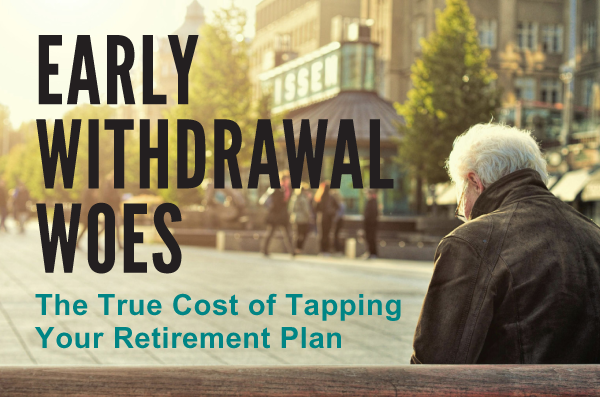
Ever wonder what happens if you tap into your retirement savings before you retire? This topic seems to be coming up a lot lately. Let’s break down the basics of retirement accounts—like 401(k)s and IRAs—and why the government discourages early withdrawals.
The government has a vested interest in citizens saving for retirement. It benefits them with future tax revenue, but more importantly, it ensures they have financial security in their golden years and aren’t solely reliant on government assistance.
To encourage saving, the government offers tax breaks for retirement contributions. However, to discourage early withdrawals, there are also penalties in place. The key age to remember is 59.5. If you reach 59.5 in a given tax year, you can withdraw funds without the 10% penalty that applies to early withdrawals.
According to a recent Fidelity study, early withdrawals are on the rise. This is concerning because it can be a very costly move. Let’s dive deeper into the specific costs associated with early withdrawals and explore why it should be a last resort.
The Ten Percent Penalty
One of the biggest reasons not to take money out of your retirement account early is the 10% penalty. Think about borrowing money from a bank, a home equity loan or other ways of obtaining the money you need, because most loans would cost you less than 10%.
Higher Tax Bracket
When you take the money out of your account, it is treated the same as if you earned that in a paycheck. It’s considered as ordinary income. This means that on top of the 10% penalty, you also pay income tax on the full amount you took out. Sometimes that pushes you into a higher tax bracket, meaning you pay even more.
Stealing From Your Future Self
While your current financial need may seem to be a priority, one of the costs of taking money out of your retirement account is that you will not have that money, nor the growth the money could have earned when you retire, so that can be very costly to you.
Borrow Instead?
Some might think that borrowing from your retirement account could be a better choice, While this could save you a hefty penalty, there is market risk. Assume you took money out of your account via a loan and you plan to pay it back in a year. What happens if the market was up 24% like it was in 2023? You lose out on those gains. It’s an expensive price to pay.
Real-Life Examples
One gentleman called me back in March and told me he decided to cash out his $700,000 retirement account to buy a vacation home. While pleased with his purchase, he was devastated with the tax consequence. Being only 53 years old he had to pay a 10% penalty ($70,000) for early withdrawal. Additionally, his income for the year was over $693,750 for 2023, putting him in the 37% tax bracket instead of 24%. Finally, he lives in a state with a 5% state income tax on top of federal. His effective tax rate plus penalties was around 50%. He gave half of his money to the government.
A call to an advisor like me ahead of time could have saved him over $170,000.
I also spoke with a young woman who went through a divorce in 2023. She decided that it would be nice to volunteer a portion of her 401(k) to her ex-husband as a gesture of kindness. Because this wasn’t something in the divorce decree, she simply cashed out her old 401(k) and gave some money to her former spouse. She too has to pay taxes on the full amount she withdrew plus a 10% penalty for early withdrawal. Had we spoken before this plan was executed she could have made the distribution a part of her divorce settlement, had the funds transferred directly from her retirement account to his and paid no taxes nor penalties.
The value of a financial advisor in a divorce situation can be many multiples of the amount spent for the advice. It may seem like the easier thing to “save money” by working things out together, but you can often create a situation where neither party benefits.
In summary, talking to a financial advisor like myself who specializes in taxes or your CPA prior to making any significant money decision can be an extremely wise decision that can save you multiples of what you would otherwise spend.
(Disclaimer: This article is for informational purposes only and is not tax, legal or financial advice. Everyone’s situation is different, so consult a financial advisor. If you would like to connect with me, please call 615-619-6919 or email me at smoran@redbarnfinancial.com.)













